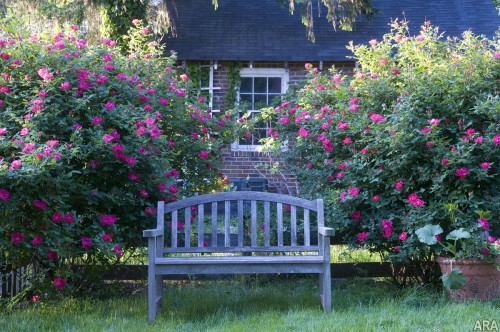
Somewhere between 5,000 and 3,000 years ago, a fellow hoping to impress his lady love was the first to give a rose as a symbol of love. We can only imagine her response, but it was likely enthusiastic enough to make him think “Hey! Maybe I should cultivate these flowers.”
Flash forward to today, and roses remain the enduring emblem of love and romance. Fortunately, however, modern breeding has made it easier than ever to add roses to your garden and landscaping.
Traditional cultivated roses have always required a lot of work – pruning, deadheading, protecting them from disease and drought, and nurturing them in just the right environment to grow. Through careful breeding, easy-to-grow roses were designed to minimize maintenance and effort, and maximize beauty, hardiness, and disease resistance.
In fact, the variety that revolutionized the concept of easy-to-grow roses, The Knock Out Rose, celebrates its 10th anniversary this year.
“I was hooked on roses by one plant in my parents’ backyard,” says rose hobbyist Bill Radler, developer of The Knock Out Rose. “Through the years, I figured growing roses should be fun with less work, so I looked for ways to eliminate maintenance demands and bred them out.”
Radler’s brainchild debuted in 2000 and was almost literally an overnight success, earning the year’s prestigious All-American Rose Selections Award. Rose hobbyists, designers, landscapers, and virtually anyone who loved the look of roses, but not the work, embraced the easy-to-grow concept.
In honor of Knock Out’s 10th anniversary, landscape designer Susan Cohan, Association of Professional Landscape Designers, offers 10 easy ways to use roses in the landscape:
1. Add a spot of color to the landscape. Could your yard benefit from some pizzazz of color to create interest? Try groups of roses in a perennial planting, around the foundation, or elsewhere to add color and texture. The constant blooms of bright showy colors work as a specimen plant or in groups of three to five plants for a big show of color.
2. Use as a problem solver. Have an unsightly spot to cover such as a garbage can, utility shed, or pool pump? Cohan loves to plant a few shrub roses to hide these problems because she knows in a matter of months the spot will be transformed into a mass of perky flowers creating a gorgeous focal point.
3. Create a “friendly” fence. Do you have a place in your yard where everyone cuts across, where you don’t want them going, or where you need to just keep them out? Colorful rose fences are lovely to look at while simultaneously deterring unwanted pedestrian and animal traffic.
4. Set the mood. Cohan recommends using color to create moods in the garden. For example, red and yellow, and pink and dark blue color combinations have a dramatic effect, while a variety of pink shades such as Pink Knock Out with pink geraniums and pink Artemesia can create a soothing mood.
5. Provide a natural habitat. Gardening for nature is all the rage. Use landscape shrub roses to start creating a wildlife habitat garden. Roses provide friendly food and shelter for all wildlife. Thorns keep out predators and rose hips keep animals and birds fed during the harsh winter months.
6. Pot it up for patio or deck. Tired of replanting that container every spring? Pot them up instead with shrub roses and then under plant with vinca vines and ivy. This provides color and subtle fragrance without the work of planting in the garden.
7. Break the rules. Replace annuals with landscape shrub roses. Why plant geraniums or impatiens year after year? For all-season, every year, a mass planting of shrub roses is a great alternative. Pick a color that will help showcase your perennials.
8. Paint a colorful backdrop. Too much green in your yard and not enough color? Shrub roses are also the perfect way to create a pleasant border or background in the landscape. Cohan likes to place bright red roses against a stone wall for maximum impact.
9. Pair roses with the right companions. Free your roses from the segregated rose beds and plant them with other shrubs, perennials, and even annuals. Here are some great companions: Blue companion plants like lobelia, cornflowers, blue flax, bellflowers, veronica, ageratum, and violet companion plants such as heliotrope are good with yellow, pink, and white roses.
10. Use as a tree on the patio or deck. When is a rose bush not a rose bush? When it’s grown as a small tree. Known as rose standards, these mini-rose trees make a colorful accent in the corner of a deck or patio.
Not all roses grow well in the same environment. All seven Knock Out Roses, however, are heat tolerant throughout the U.S. and will need winter protection in only the coldest regions. They are available at your local garden center, and you can learn more about adding easy-to-grow roses to your garden at www.theknockoutrose.com.
Courtesy of ARAcontent
Related posts: